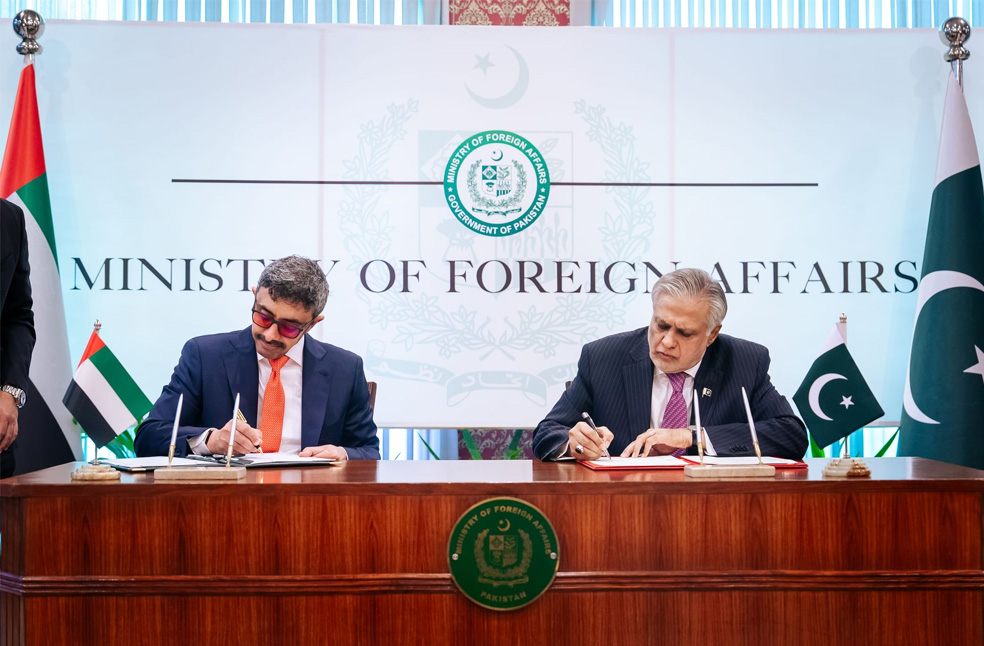UAE Ties Show Pakistan’s Global Outreach

Pakistan’s foreign relations have witnessed a remarkable upswing in recent months, reflecting its active diplomacy and growing engagement with key international partners. A significant development in this trajectory is the recent high-level interaction between Pakistan and the United Arab Emirates (UAE), reaffirming the enduring and multifaceted nature of their bilateral ties. On April 21, 2025, a high-level meeting in Islamabad between UAE Minister of Foreign Affairs Sheikh Abdullah bin Zayed Al Nahyan and Pakistan’s Deputy Prime Minister and Finance Minister Ishaq Dar resulted in the signing of multiple Memorandums of Understanding (MoUs), further deepening cooperation in consular affairs, trade, and cultural exchange.
The visit by Sheikh Abdullah, who also met with Prime Minister Shehbaz Sharif, marks a continued emphasis by both nations on building a resilient and mutually beneficial partnership. The warm exchanges and ceremonial hospitality highlighted the strong political will on both sides to transform long-standing fraternal relations into practical, forward-looking initiatives. The agreements included the establishment of a Joint Consular Affairs Committee and enhanced cultural cooperation, ensuring smoother administrative facilitation and greater people-to-people ties, particularly for the millions of Pakistanis residing in the UAE.
A particularly noteworthy outcome was the exchange of an MoU to establish a UAE-Pakistan Joint Business Council. The agreement, signed between UAE Assistant Minister for Economic and Trade Affairs Saeed Mubarak Al Hajeri and Federation of Pakistan Chambers of Commerce and Industry President Atif Ikram Sheikh, is poised to play a pivotal role in stimulating bilateral trade, enhancing private sector collaboration, and creating new avenues for investment. This council is expected to serve as a structured platform for dialogue between business communities in both countries, aligning with Pakistan’s broader vision of economic revitalization and foreign investment promotion.
The visit was also attended by several prominent Emirati officials, including UAE Minister of State Ahmed bin Ali Al Sayegh and Assistant Minister for Energy and Sustainability Abdulla Balalaa, underscoring the importance the UAE attaches to its partnership with Pakistan. Sheikh Abdullah reiterated the UAE’s commitment to enhancing cooperation across various sectors, stating that the bond between the two nations is rooted in friendship and shared developmental goals. Deputy Prime Minister Dar reciprocated this sentiment, referring to the UAE as a country very close to the hearts of Pakistanis and highlighting the historical, cultural, and emotional ties that bind the two nations.
Prime Minister Shehbaz Sharif also expressed his gratitude for the UAE’s continued support and emphasized Pakistan’s desire to transform political goodwill into robust economic collaboration. He stressed that while the political relationship is already exemplary, the future lies in expanding trade, investment, energy cooperation, and human capital development. Sheikh Abdullah’s visit came on the heels of a similar visit by Abu Dhabi Crown Prince Sheikh Khaled bin Mohamed bin Zayed Al Nahyan earlier this year, during which five other agreements were signed. These included areas such as banking, infrastructure, mining, and railways.
During the talks, both countries expressed optimism about leveraging untapped potential in trade and investment. Pakistan’s pharmaceutical, textile, rice, and surgical instrument industries were identified as strong candidates for market expansion. Deputy Prime Minister Dar emphasized the mutual benefits of strengthening trade ties and invited Rwandan businesses to participate in upcoming commercial expos like the Pakistan-Africa Trade Development Conference in Addis Ababa.
This positive diplomatic momentum reflects Pakistan’s commitment to constructive international engagement and strategic economic partnerships. It also underscores the country’s growing role in regional and global affairs. As a non-permanent member of the UN Security Council, Pakistan continues to support peace efforts and stability initiatives, including those on the African continent, which was acknowledged and appreciated by the Rwandan foreign minister.
The recent engagements with both the UAE and Rwanda showcase Pakistan’s evolving foreign policy that blends traditional alliances with new partnerships. These initiatives not only affirm Pakistan’s dedication to multilateralism and regional cooperation but also highlight its ambitions to serve as a bridge between regions, cultures, and markets. With a significant diaspora contributing to development abroad, a young and dynamic population at home, and a leadership determined to open new frontiers of diplomacy and commerce, Pakistan presents itself as a responsible, proactive, and forward-looking member of the international community.
Conclusively, the foundations laid by these meetings in Islamabad are expected to translate into lasting institutional mechanisms and people-centered cooperation. From consular facilitation and cultural exchanges to joint business ventures and collaborative development strategies, Pakistan is steadily reinforcing its position as a key player in shaping a more peaceful, prosperous, and inclusive future for its citizens and its global partners alike.







